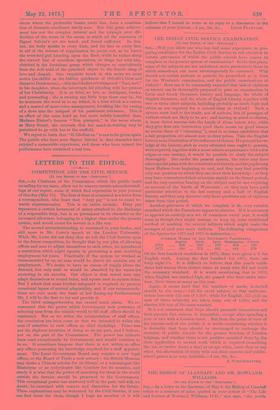THE INDIAN CIVIL SERVICE EXAMINATION.
[To THE EDITOR OF THE "SPECTATOR:1 you allow one who has had some experience in pre- paring candidates for the Indian Civil Service to call attention to certain grievances of which the public schools have reason to complain in the present system of examination? In the first place, some of the subjects are too undefined, more particularly those in which schoolboys can most advantageously be examined. Why should not certain authors or periods be prescribed, as is done for the Woolwich examination, and the public examinations at Oxford ? How can it be reasonably expected that lads of eighteen or twenty can be thoroughly prepared to pass an examination in Latin and Greek literature, history and language, the whole of English literature, and the whole of English history, together with two or three other subjects, including probably as much logic and ethics as are required for a second-class at Oxford ? Such a system must lead to the study, not of authors, but of passages of authors which are likely to be set; and leaving so much to chance, it must throw success into the hands of those tutors who, while they give first-rate instruction (and there seems no good reason to accuse them of " cramming"), send in so many candidates that a fair proportion are almost sure to draw prizes. Take the English history as an illustration of the influence of chance. Ha general know- ledge of the history, such as every educated man ought to possess, were required, together with a more minute acquaintance with a few reigns or one century, it would be possible to study the subject thoroughly. But under the present system, the tutor may have taken special pains with the constitutional history, and his pupils may know Hallam from beginning to end, and they may find possibly only one question on which they can show their knowledge ; or they may have concentrated their attention mainly on the Stuart period, and the only question bearing on the subject may be one requiring an account of the battle of Worcester ; or they may have paid particular attention to the last century and a half of English history, and they may discover only three questions out of eighteen taken from that period.
Another grievance of which we complain is the very variable standard which the Examiners appear to observe. If it is necessary to appoint an entirely new set of examiners every year, it would seem as though they might manage to keep up some traditional method of marking the several subjects which might make the averages of each year more uniform. The following comparison of the figures for 1873 and 1875 is instructive :-
AVERAGE MARKS OF ALL SUCCESSFUL CANDIDATES.
English. Greek. Latin. Mathematics. Science.
1873 490 ... 266 ... 258 .. 202 169 1875 390 ... 273 261 ... 442 ... 279
Of the first hundred candidates in 1873, three were given a 0 for English work. Among the first hundred for 1875, there are forty-eight O's. It is difficult to believe that this year's candi- dates had among them sixteen times as many who did not reach the necessary standard. It is worth mentioning that in 1873, when English was marked high, six passed who were under nine- teen, three times as many as this year.
Again, it seems hard that the numbers of marks deducted should be the same,-125 for every subject, so that mathema- ticians lose only 125 out of 1,250; while for English, 375 (125 on each of three subjects) are taken away out of 1,500, and for classics 250 out of the same number.
It is not unnatural that boys should persuade themselves and their parents that success is impossible, except after spending a
year or two with a London tutor. But from the point of view of the parents and of the public, it is worth considering whether it is desirable that boys should be encouraged to exchange the
restraint of public schools for the greater freedom of London lodgings, and whether there is not positive mischief done by the close application to mental work which is required (something like ten or twelve hours a day) at an age when, more than at any other, the alternation of study with out-door exercise and public- school games is so very desirable.—I am, Sir, &c., A SCHOOLMASTER.


































 Previous page
Previous page